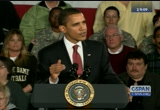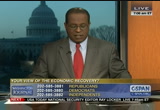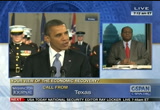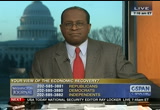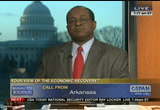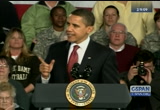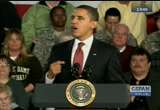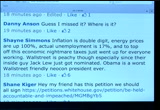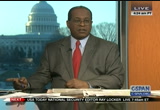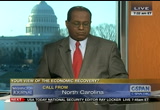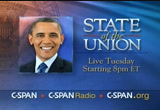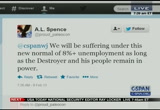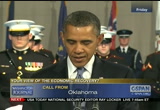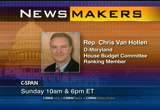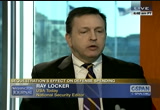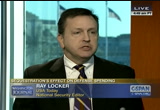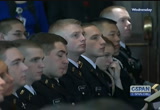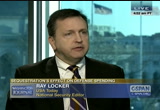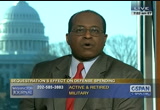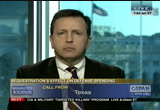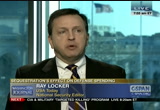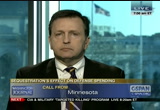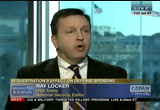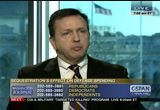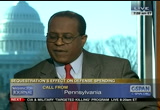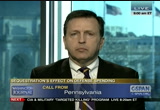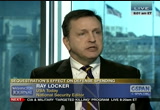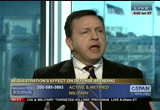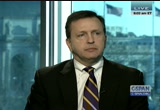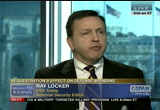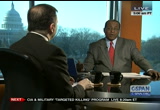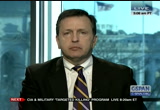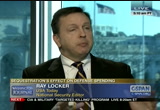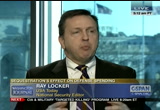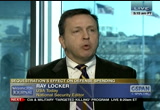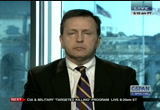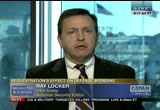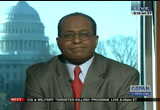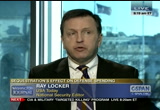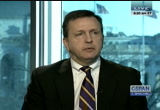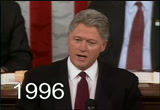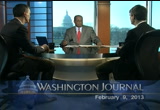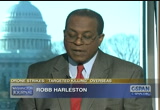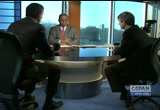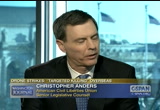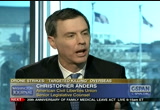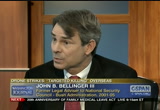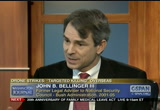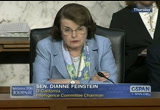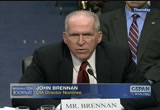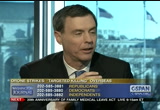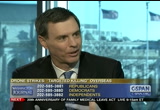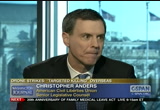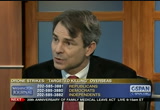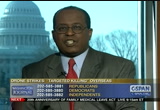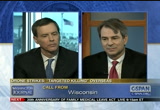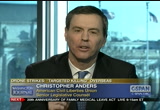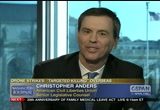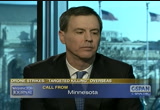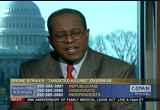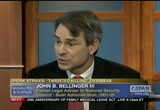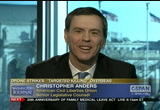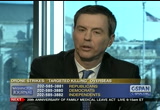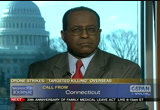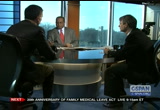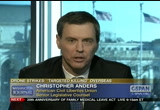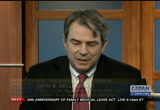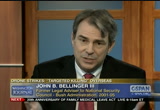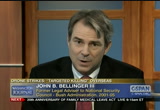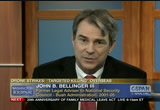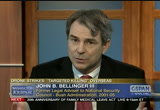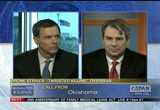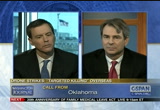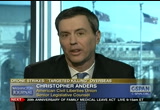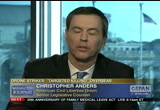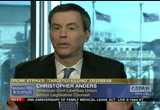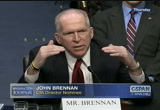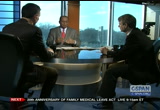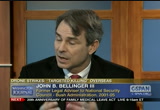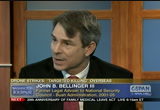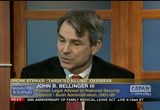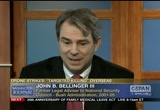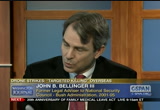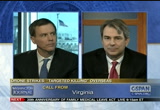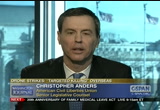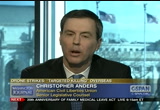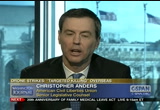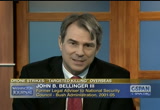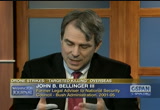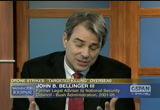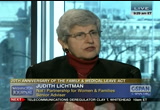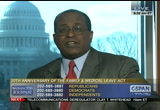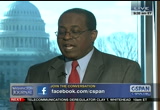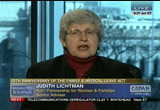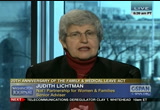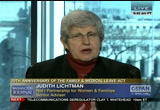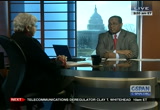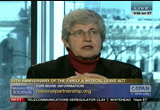tv Washington Journal CSPAN February 9, 2013 7:00am-10:00am EST
7:00 am
strikes and the targeted killing of suspected terrorists. and they look at the family and medical leave act with the national >> four years ago resident obama traveled to indiana to sell his economic stimulus plan. we are asking for you to give us your view. welcome to this addition of the washington journal. we want to know from you what is your view of the economic recovery the president talked about four years ago. here are the numbers --
7:01 am
you can also reach out to us via social media. the address is on the screen. for twitter, the address is cspanwj. pan.book.com/c-spas or you can e-mail journal@c- span.org. we begin by talking about the speech that the president made four years ago in elkhart, indiana. it is part of the nbc news elkhart project. we will talk more about that.
7:03 am
7:04 am
we are lucky that we are not in worse shape in a severe depression. the banks keep doing business. things need to change fast. host: what kind of work do you do? caller: i am a diesel mechanic by trade but i now go to school. i go to school so that i can -- they treat the workers wrong. everyone is wondering what is going on. people need to get organized and stand up. people criticize occupied. it is everyone or himself. -- it is every man for himself. the big thing is it is you i guess whoever is behind the counter.
7:05 am
host: we will move on to ralph and michigan on our democrat line. caller: the economy is going to stay slow. i am in michigan. we have done in this deindustrialization high unemployment economy for the last decade. now, the rest of the country is getting the same thing. i think oil prices and gas prices are going to stay high. that is going to slow any recovery. if the economy picks up, and people use gas, and more economic activities, the price of oil will go up. that will slow any recovery. i have seen slow growth for a long time.
7:06 am
i am in the peak oil crowd that gas prices and oil prices in the long term will remain like right now. it is four dollars per gallon. host: it depends on what part of the country. what do you do in battle creek? caller: i am retired. in battle creek, the plans have been closing down. we only have two that are active. they do not employ that many people. the automobile industry year has been cutting back years. the bright side is they do have some small japanese parts manufacturer opening up a plant here.
7:07 am
the unions are broke. they have been broken. wages are low. host: as we continue our conversation regarding your view on the economic recovery. we want to take a look at what the president said four years elkhart, indiana. [video clip]>> even with this plan, the road ahead will not be easy. this crisis has been a long time in the making. we will not turn it around overnight. recovery will be measured in years, not weeks or months. we know that our economy will be stronger for generations to come if we commit ourselves to the work that needs to be done.
7:08 am
commit ourselves today to the work that needs to be done. being here in elkhart, i am confident that we will get where we need to be. i know people who are struggling, but i also know that people here are good workers and good neighbors who step up to help each other out, who make sacrifices when times are tough. [applause] i know that all folks here are asking for the chance to work hard and have that were translated into a decent wife for you and your family. you will be doing your part. it is time the government did its part, too. host: we are talking about your view of the economic recovery. this is based on a speech the president made four years ago in elkhart, indiana. on twitter this morning, we have this from steve harrison. he says --
7:09 am
sorry about that. back to the phones. steve and indiana, democrats. caller: good morning. i live a half an hour away from elkhart. anyone who has common sense would agree that president obama has failed elkhart. he spent a lot of time there. i was living in fort wayne, indiana. i used to drive to see a friend of mine in south bend. i drove through elkhart. they are known as the rv capital of the united states. they almost went bankrupt. because of the stimulus package , they are hurting more people. a are expanding plants now. people who aren't saying that
7:10 am
president obama has done nothing in his first term, i do not know what planet they are on. i really do not. host: -- caller: the auto industry is booming. elkhart is hiring people. host: how far is south bend from elkhart? is this economic boom extending beyond elkhart? caller: i am about a half an hour from elkhart. south bend is a different story. we lost to the hall of fame. we have a new mayor. south bend being the second- largest city in indiana, it is not doing what it should be doing. we have abandoned buildings. they have stimulus money. they are redoing a bridge for
7:11 am
purification, which i do not understand where that money came from. host: addison, front royal, virginia, independent. caller: good morning. thank you for taking my call. you need to get the oil companies under control. they have risen -- raised the price on fuel. oil is $150 per barrel. gas prices are four dollars or more per gallon. they keep raising it up. it is greed. there is enough oil on this planet to last for an eternity. we have been lied to.
7:12 am
host: we will leave it there. kevin, marshall, texas, republican line. caller: there is no economic recovery. look at the facts and statistics. it is not there. we have 5 million less jobs now than we did when president obama entered office. i was looking at the percentage of our workforce. .t is -- it topped out at 66% last call or talk about the price of gas. the president's friends and asked her $1 trillion per year. it us dollar. that is why we are seeing gas prices stay where they have been for the last four or five years. i do not see it getting better
7:13 am
until we adjust the debt. we cannot grow. this is a false economy and false stimulus. democrats have spent an extra stick straight and dollars to try to make the economy do something. it has not. host: kevin, texas. this is more from the first read abc news.com. they write -- this is more from the first read at nbcnews.com. --
7:14 am
we are talking about your view of the economic recovery. iowa. caller: there are a lot of negative views in the economy. take a step back. our economy is not in the same way going forward. we have had tons of growth over the last three or four decades that has been driven by technological revolutions, increasing middle class. we in this new normal where we will have slow growth longer. it is easy for the public to focus on the debt and deficit and what is going on in washington. there is still some growth out there. the housing sector is coming back. the auto sector is coming back.
7:15 am
those are positives that get completely put back to the forefront when everyone is talking about the debt. host: tom, elkhart, indiana. on our democrat line. caller: elkhart is the recreational vehicle capital. we went down on that in 2007 when the oil prices went up. we are manufacturing housing. we are the musical manufacturing capital. for band and treatments and such. they are made here anymore. are headquartered here, but the work is not here. i do not see how this works. host: were you at the president
7:16 am
's speech in 2009? what did you think when the president came to town? caller: it was helpful. he is doing what he can. he has faced a lot of resistance. it is postindustrial. i am working in michigan four eight federally subsidized wheelchair van. mostly my passengers are senior citizens and disabled people. the 47% that romney talked about. host: we will move on to charles, arkansas, on our line for republicans. caller: i wonder with all these people saying that it is doing so good. the individual that called in from new hampshire. he said he would work from home because the companies are not
7:17 am
paying enough. who is he going to work for? you are working for home -- from home for a company. as far as the unions go, the unions can go out and start their own businesses. compete. that would work. when you wake -- when you make an arrangement with your employees and management, you say in good times, everyone participates. in bad times, everyone takes the short. there is no way that you are going to improve this economy until you get the government of the businesses back. the businesses make this country go. there is no business anymore other than a few large businesses. we are talking 5 million people who have lost their jobs because of this president tossed basic
7:18 am
-- president basic way of thinking. he cannot do anything with the economy as far as energy goes because he has stopped that with the plants. he will put it here in the united states or china. i want to thank you. host: thank you for your call. next is robert, clinton, maryland on our line for democrats. caller: i do not mean to put anybody down. one thing about conservatives is they never quit. no matter what happens, they do not change. the economy could have been
7:19 am
worse if president obama had not initiated the stimulants -- stimulus to help save the economy. we were in a tailspin. republicans he stored the economy. this man comes along and side decides to save it. they are still fighting him. that sequestration deal -- this will completely destroy the economy. we need to spend money to exist. in the u.s., you just cannot stop spending money. if you do, it will be the end of us. these people are haters. they are not going to change the way they think. thank god there are enough people in this country who think progressively. maybe we can turn this economy around and help america.
7:20 am
have a nice day. host: robert brings up the sequestration. we will talk about that later with ray locker of "usa today." he will talk about the sequestration's effect on defense spending. that will be and about 25 minutes. we want to show you more of the president's speech four years ago and elkhart, indiana where he can each -- pitched his economic plan. he talks about the people who have lost their livelihood. [video clip]>> nearly 600,000 in the past month alone. when we say that this area has lost jobs faster than anywhere
7:21 am
else in the united states of america, with an unemployment rate of over national security editor $1.2 trillion% when it was 4.7% just last year. we talk about layoffs in companies like keystone rv. companies that have sustained this community for years. we are not just talking numbers. we are talking about people in the audience here today. people not just and elkhart, but all across this country. people who have lost their livelihood and do not know what will take its ways. we are talking about parents who have lost their health care and lie awake at night praying their kids do not get sick. we talking about families who have lost the home that was the corner, there foundation for the american dream. young people have put that
7:22 am
college acceptance letter back in the below the country cannot afford. -- back in the envelope because they cannot afford it. that is the true measure of this economic crisis. those are the stories i've heard when i came to elkhart six month ago and those are the stories i have carried to the white house. i have not forgotten. i promised you back then that i would help this community recover. i intend to keep my promise. [applause] host: we are talking about your view of the economic recovery. on facebook, we have a conversation. shanyne simmons writes --
7:23 am
back to the phones. north carolina on either republican line. caller: i wanted to speak about how many jobs we are not keeping up with with the population growing. and how the fed redistributes wealth where no one is pleased how the fed is buying up the mortgaged back housing market. the fed is running a ponzi scheme. they are saying we are borrowing from china and japan. the effect is running a ponzi scheme. you have the banks going in and
7:24 am
shortening silver. that is silver -- that is illegal. they want the executives off to the white house. this is the biggest wartime spending president in history sin. oil companies right now have to go to -- [indiscernible]as long as this dollar is weekend, oil will remain high. host: we will take a look at some tweets that have come in on twitter. the address is journal@c- span.org -- cspanwj.
7:25 am
7:26 am
the national unemployment is at about 11.2%. when they take the census, that is people who are on unemployment. what about the people who have ran out of unemployment? what about the people who not only have ran out of their unemployment but no longer have a job? they are at a point where they have to look out for years. that is not on there. that is reality. it is almost double that amount. it does not surprise me.
7:27 am
host: what kind of work are you in? caller: i am retired. host: what were you doing for years ago? caller: retired. host: in terms of being retired, have you seen a change in the economy over the last four years? caller: no, it is not real good. i am looking at you on the television. i am not going to blame it on anybody or anything. it is a sad thing that when i sit here and watch television, just being a regular american citizen, i sit there and see when the president says, according to the survey across
7:28 am
7:30 am
you can read more of that in washington post"qwashingto ." caller: i am calling from southwest pennsylvania. the last 3.5 years, we have had 3000 natural gas wells drilled here. the power plants are using 40% more gas, 20% less coal. we have wind farms and we had four new hydros fro the ri -- fror the river. the us steel is putting in a $3 billion expansion here. the bad times here were in 2007, 2008, and 2009. the younger people here are getting jobs. what we have to do -- we got a
7:31 am
brand-new multimillion dollar gas compression station. we will export the gas. we should tax all exported oil. the only reason they want to drill in the gulf of mexico is so they can put it on a boat and ship it out of here. host: we are talking about your view of the economic recovery this morning. this is ace on a speech that the president made four years ago and elkhart, indiana. we have taken that from nbcnews.com. it is part of their elkhart project. if you want to get more information. .hat is at nbcnews.com charlotte, north carolina,
7:32 am
herbert, on our line for independence. caller: i have been listening for a lot of the news. nbc.news, mnms this country had 400 years of free labor in 100 years of no regulations where they were polluting the air, water. chop labor laws. things were booming. the people on the top have always had and the people on the bottom have never had. my mother does not know what these the question is or what the debt limit is. people are blaming barack obama for trying to turn this contrary -- country into a communist country. if you have 5000 young people going to war in iraq and
7:33 am
afghanistan, and at the same time, we have thousands of kids going to florida for spring break, the top have always had. as long as the top has, the cheating and lying. take madoff. no one knew who he was before he got caught. he was well respected. look back at this country. it has always been poverty in the poor communities. now, it is spreading out. people are just upset with the fact that a black man is in office. they want to throw the blame on him. it is not him. look at the people who are surrounding him. they are not black people. this country has been made up of immigrants and people come to this country. the true american is the indian.
7:34 am
until people realize that, we have to come together and help each other and spread the wealth. it is not social knows him or communism. no one is trying to take anyone's guns away. a group of people are so used to having things their way and now that it is not their way and you have to share, they feel someone is taking away from them. oft: the president's state the union address is coming up on tuesday. this is the way it is bringing -- that is the way it is being previewed in the wall street journal --
7:35 am
let us show the folks he tells regarding our coverage. that will be live at 8:00 p.m. on c-span, c-span radio, and streaming live from www.c- span.org. our coverage starts at 8:00 p .m. eastern time. it will be followed by the republican response from florida senator marco rubio. we will hear from journalists and other numbers of congress. we went to get your views by phone, torture, and facebook.
7:36 am
that is tuesday night. if you want to find out more about our coverage, go to our website. you can find out everything you need to know about what you will see here on c-span. on our line from democrats, st. petersburg, florida. caller: the economic recovery depends on jobs. the republican congress has voted against chop bills. republican governors have cut budgets by laying off public workers. our governor will fire over 500 custom real workers in public schools and privatize those jobs. republicans do not want to raise taxes. they want retirees to come to border.
7:37 am
taxes were eliminated on stocks and bonds. low-wage workers if the shaft. you can get fired if the boss is in the bad mood that day. host: tom, dayton, ohio on our line for independence. ts. caller: it is better than what it was. there is not a whole lot of different between the democrats and republicans. host: you do not think so? caller: not with the economic issues. president clinton blew it for me. that is why i did not vote for hillary. that is why she will never get elected because of the nafta a nd glass-steagall. i voted for president obama. i retired and went back to work to make extra money.
7:38 am
i see people out here. i would like to know the people who work for $10 per hour and pay insurance. host: what kind of work did you do? caller: i worked at a food manufacturer. host: you went back to work? caller: i was only 55 when i required -- retired. host: are you still working? sicko i work in a machine shop. -- i work in a machine shop full-time. i'm a $10 per hour 30 years ago. i hear these people call them lazy people on food stamps. it amazes me. host: in the chicago sun-times morning on the front page, the story of jesse jackson junior
7:39 am
with the headline -- read more about the trials and tribulations of representative jesse jackson, jr. we are talking about your view of the economic recovery. we have a couple of more tweets that have come in. let us go back to the founds. rick, oklahoma, on our line for republicans. caller: this country is and one
7:40 am
heck of a shape. when clinton was in office, we were in good shape. when bush got in, we went downhill. our president talks about taking us over the edge. not only that, we have gotten into two wars that we cannot pay for. i was about $1.2 trillion or so. when we got out of iraq, nothing has changed there. i do not see what will change and afghanistan. we give people tax breaks, the rich people for the past 11 years. how much has that cost? we have a dysfunctional congress.
7:41 am
we have a republican-controlled congress that has been in power for over two years. they have not done anything. they want to bring -- blame the president for the jobs. host: on the front page of this morning's washington post -- there is more on that and other papers like the "new york daily news" with the headline --
7:42 am
back to the phones and our discussion of your view of the economic recovery. m, baltimore, maryland, on our line for democrats. caller: i think if they would take and drop the fuel bill, that would bring this country right back. they are raising the prices up so high that people cannot afford to look for a job. host: tom, new jersey, on our line for independents. caller: these comments you hear
7:43 am
people make about obama being a socialist or communist. that is the same stuff they set about fdr. he is not a communist, socialist or liberal. he is a conservative. i voted for him in this election. the last election i voted for ralph nader because i like his views on the banks situation. host: you say that you voted for ralph nader in 2008? and the president in 2012? caller: what was it about the economy and the recovery that made you change your feelings and your vote to not vote for the president in 2008 and to vote for him in 2012? caller: the economy has improved
7:44 am
7:45 am
of the financial times. i want to tell you about what is coming up later on in this edition of the washington journal. next up is "usa today's ray locker on how the sequestration will affect the defense budget. later, a look at the cia and the military's targeted killing program that uses lethal force to kill enemies. on newsmakers this week, representative chris van hollen of maryland will be our guest. he talks with reporters about the decisions facing congress as it moves closer to across-the- board spending cuts scheduled to begin in march as well as president obamas state of the union address and what the credit house members did at the
7:46 am
three-day retreat this week in leesburg, virginia. this is a little bit about what he had to say in the interview. [video clip]>> i would prefer to see us resolve this before we hit that much one trigger date. i do believe that if we go over it, i hope republicans will come to their senses. >> what is the game plan if we go over the deadline? how much time do you think that congress and the white house has to deal with it before it becomes a economic draft? >> it has already become an economic drag. look at the last quarter economic numbers from last year. you saw a downturn in economic activity. a factor behind that has been the anticipation of the across-
7:47 am
the-board cuts. if you are getting a slowdown in cuts, it will get worse once one set march -- 1 deadline hits. you are raising the question about all of the things upon us. march 27 is when the government 's authority to operate neends. republicans have moved to the debt ceiling debate to may 18. you have all of these self- imposed economic wounds. we should be dealing with them all at once in a comprehensive manner. if we cannot deal with it for a 10 year period, deal with it for the remainder of the fiscal year. that is what the house democratic alternative did. we would replace the sequester with the hotel -- with deficit
7:48 am
reduction achieved over a longer amount of time. host: ray locker is the national security editor with "usa today ." he is here to talk to us about the sequestration's affect on defense spending. what exactly is sequestration? guest: it means mandatory budget cuts. they were part of a 2011 deal that congress and the white house agreed to. they were worried about raising the national debt ceiling, which is $16.4 trillion. republicans hoped to try to force a general deduction of overall spending. it came down to this deal where it was they would do a supercommittee that would come up with a deal by the end of 2011. they did not. if they did not reach a deal by the end of 2012, they would have
7:49 am
mandatory budget cuts of $1.2 trillion over 10 years. the first were supposed to kick in this year. now that they have extended that, we are looking at about $90 million of mandatory cuts split between regular government spending and defense spending. they are supposed to kick in march 1. host: what is the seacrest -- what does the sequestration mean for the defense department? caller: you are looking at about $15 billion of cuts. unlike other cuts that could happen to government agencies, they go across the board. you are looking at taking major chunk of operations out of programs. we are fighting a major war in afghanistan. that is separated. you are looking at the cuts taking effect in areas that are
7:50 am
having a disproportionate effect and different parts of the budget. host: they are moving toward the sequestration. how is this playing out on both sides of the capitol hill? guest: this is where you have bipartisan agreement. defense spending is spread throughout the country. virtually every congressional district in the country. there are programs and companies and players that will be affected by cuts anin defense spending. host: throughout the week, folks have been talking about this. the president talked about it during the retirement ceremony for defense secretary leon panetta. panetta talked about it wednesday at georgetown university and warned about the damage sequestration would do to the nation's economy. this is a little of what he had to say.
7:51 am
we will continue our conversation with ray locker of "usa today." [video clip]>> if this happens, we will fire as many as 8000 dod employees throughout the country. they could face a 20% cut in their salary. you do not think that will impact our economy or jobs? you do not think that will impact our ability to recover from the recession? we will cut back on army training and maintenance. putting about 2/3 of our active for great -- active regain combat at a reduced level. we have to cut their training. we will have to cut back on the ability to support the troops who are not in the war zone. we put more stress on those who are in the war zone.
7:52 am
we are going to have to shrink our global naval operations. with a reduction of our western pacific naval operation. this idea about having to rebalance will be impacted. we will cut the air force flying hours and weapon system maintenance, putting fighting units below acceptable readiness standards by the end of the fiscal year. this is not a game. this is reality. host: ray locker of "usa today." when the defense secretary says this is reality, is he trying to scare the members of congress into acting before the sequestration takes a fight? caller: there is some of that. most members realize that these cuts will be serious. particularly the members of the appropriations and armed services committee. they have read into these issues for a long time. they have known since the bill
7:53 am
was passed summer 20 11 that these would be serious thanks. they remain serious. there is an element of scare tactics but a lot of it is reality. host: we are talking about -- we are talking with ray locker from "usa today." if you would like to get involved in the conversation, the numbers are on the screen -- we have a special line for active and retired ella terry members. that number is -- for active duty and retired military. our post-call -- our first call comes from houston, texas, on our line for independents. caller: i am for the
7:54 am
sequestration. i believe that the defense budget is overly inflated. we have not had a clear exit strategy. we have to keep our body alive. so we can use those resources that we have wasted four years to help our country stay alive. it is a fallacy that in this day and age, we have such a large military and spite of the word. we could cut back those resources for technology that helps us defend ourselves against terrorism and future threats. there is no excuse for such an
7:55 am
advanced country to have to have such an inflated military budget. and you scare taxes to make people feel that if we do not increase it or maintain it, that somehow we are in jeopardy constantly. host: your comments. caller: there are plenty of people who believe that. we are looking at $487 billion in cuts to the defense budget that will happen over the next 10 years anyway. we are looking at if sequestration takes effect, another $500 billion in 10 years on top of that. if they were both to happen, we would be at $100 billion per year in reduced defense spending. there has been room to cut before. there is plenty of ways. we report on it area often at "usa today." i will not take one side.
7:56 am
there is waste. the people who are involved in a military belief that the cuts on top of the existing cut would be too severe. h calost: leonard, on the democt line. caller: most of our congressmen and local legislation, if they that stop wasting --money they spend on plane rides and limousine rides to lunch and back and forth. that is war on the poor. it is sad. i love the presidency. he is doing fantastic. he is just a man. he is not superman.
7:57 am
it will take time to get things taking care of. just like the gentleman said, if they would cut the paychecks of the legislators in half, then, we would be out of the deficit in no time flat. host: how much cover operation -- cooperation does there seem to be between the president and congress to avoid sequestration? guest: not much. they are talking. it is not direct talks between the resident and house speaker john boehner. white house staff talk to congressional staff all the time. it is more than just whether we spend too much money on defense. when you take money out of the economy, regardless of whether it is for defense spending were health resort just -- research, it has an overall economic
7:58 am
effect. when you are looking at seven point nine percent unemployment, when you take that money out of the economy, you will have a negative economic impact. this was put out by roll call in may 2012. it talks about the defense request to -- sequester -- this was back in may that they were talking about this. it seems like there has not been tasked the best there has not been much advancement since may. guest: what you saw at the end of last year when they talk about the debate over the fiscal cliff and whether there would be a grand bargain to have some higher taxes, which we did get and an agreement to decrease overall government spending. there were talks then. they reached a crisis point.
7:59 am
they had to hide your -- they had to make higher revenues. there was not in any agreement on overall spending cuts. we will try to do that to try to satisfy congressional republicans who demand cuts in government spending. host: pittsburgh, pennsylvania, republican and retired member of the military. what were you doing in the military? caller: i was in the navy for 30 years. administrative work, legal work, management. i retired after 30 years in 1989 as a master chief and the navy. host: your thoughts about the sequestration and its affects on dispense spending -- defense spending. see call -- caller: we always
8:00 am
had the problem of the congress and special interest groups giving the pentagon thinks they do not want or need, whether it they happen to be built in their districts. there is always plenty of room. as i understand it, the idea of the sequestration and originated with the president and his budget director, mr. lew. that is how they came up with this concept. republicans should simply let the thing become a fact. it is the only opportunity we have to make the present make any cuts at all. he seems to be so opposed to spending cuts and is only interested in finding tax and revenue. in my personal opinion, what we
8:01 am
need to do is step back and take a look at our military and our commitments. we have bases in europe that have no reason to be there, certainly not in the numbers we are. host: we will leave it there. thanks for your call. ray locker? guest: we have a lot of military commitments all over the world. do we need to maintain a base in germany, for example? we could lessen our footprint there. there is a base on the islands in the atlantic that are controlled by portugal. we could dial that all presence there. if things get bad enough and there is an emergency and other nations realize it is a problem, we would have access to those basis. host: the caller talked about sequestration actually been a
8:02 am
project put forth by the president and jack lew, the president's nominee to be the secretary of the treasury. if lew is confirmed by secretary -- as secretary of the treasury, what effect will that have on sequestration? guest: i do not know the exact agenda which the with-the genesis of the sequestration idea. -- the exact genesis of the sequestration idea. they have managed to delay it for a couple more months. as far as when jack lew become secretary, assuming you will, he will be involved in all manner of financial and budget issues and he will have to deal with these cuts if they happen. host: another pending addition
8:03 am
to the obama administration is senator chuck hagel, who was been nominated to be the secretary of defense. if he becomes the secretary of defense, what is his involvement in the sequestration process going to be? guest: he will be in general in making these cuts happen. he is a veteran and a former member of the senate armed services committee. he knows the military. one of the reasons he was brought into this is because he knows how to cut. he knows what works and what does not. at least that is what the administration thinks. he will be an effective person, and leaves the white house hopes, in making these cuts take place. host: we are talking with ray locker, the national security editor at the newspaper, usa today. our next call comes from st.
8:04 am
louis on our line for republicans. go ahead, greg. caller: even though the sequestered takes place, instead of spending 40 cents of every dollar, we would only be spending 38 cents out of every dollar. i did not know if it makes a difference. i think we need sequestration. thanks. guest: one of the things that many people are arguing is that we should let these cuts happen. people argue that the time of the fiscal cliff that we should let the cuts happen and the bush tax cuts all expire. they would be ripping teeth and a gulf of the problem. you would feel short-term pain, -- ripping the bandaid off of the problem. you would feel short-term pain. a lot of people are afraid of having that happen with the potential of job losses.
8:05 am
there would be job losses in sequestration on the domestic spending and the defense spending side. he estimates are 3.5% loss of gdp would take us into recession -- 0.5% loss of gdp would take us into recession. that would happen in the next quarter if the sequestration cuts happen. host: we have an article from bloomberg. budget cuts totaling $109 billion. defense cuts would be $55 billion. mostly discretionary. non-defense discretionary, $38 billion. non-defense mandatory, $16.70 billion. explain the difference between non-defense discretionary and 9-
8:06 am
defense method -- mandatory -- non-defense mandatory. guest: certain research programs as certain agencies. they are not like social security and medicare. whatever the government wants to do. food aid to various segments of the population. mandatory programs are things you have to have, whether they are entitlements or things like that. host: we have a tweaked -- tweet that says, my son, said cut what? what influence do people who wear the uniform have on sequestration cuts?
8:07 am
guest: it boils up from the bottom. people at various bases talks to -- talk to the members in the chain of command. it is taken into consideration when they determine what they need to cut. there are people who work at any military base throughout the country and the world to feel like their feelings and their sense of what is right and wrong are not taken into consideration. host: the next call comes from oklahoma, retired military. no head. caller: i would like to speak about this. our government spends way too much. our largest spending is the welfare department, which needs to be seriously looked at. too much abuse is being done. as far as the military goes, we have 950 basis. we are trying to police the
8:08 am
world. we should have a strong national defense. and the drone war. it is not working. too much money is going the would-- too much money is going toward back -- that. host: you talked about bases around the world. there are no base closures in sequestration. guest: that is done by base closure alignment commissions. the last round was 2005. there may have been one after that, but the big one was in 2005. it is to take the politics out of the process. host: back to the phones. tanya in oklahoma on our line for democrats. color -- caller: i understand that as a consumer, we have to have a
8:09 am
balanced budget for our economy. there have been so many years in war. it is taking a toll on citizen tree. -- citizenry. a lot of the veterans are coming back with posttraumatic stress. the congress has votes for the wars and increase our budget for the wars. this has taken a toll on our economy. we need to build up our people. he economic times we just went through, they have been devastating to people's lives. people in the military are people who are working. that is our citizenry. we can have a balanced approach, not so much on military
8:10 am
contracts or whatever. we need to have that and we need to increase what happened to people who served in the military. host: we will leave it at that. guest: she talked a little bit about effects on the people. host: 2014 service member perez of 1%. down from 1.7 -- service member perret's of one. -- 1%. service member pay raise of 1%, down from 1.7%. guest: she mentioned people with ptsd. we have had people in the military since the beginning of the war in afghanistan in 2001 doing multiple stores in combat
8:11 am
zones. -- tours in combat zones. they are suffering a range of mental illnesses. we are just now getting a sense of what that is going to cost. people in active duty military. it will become part of the department of veterans affairs spending. it could go into the trillions of dollars when you take it out over a period of decades, 20, 30, 40 years, as these people get older and still deal with the compounding problems. host: one of the members of your paper talks about reductions of aircraft maintenance by 1/3. how will they do that without making pilots nervous and people living around here force base is nervous about planes falling down around their homes tumble
8:12 am
guest: -- airforce bases nervous about plans falling down around their homes? guest: people who fly will train lesson they will have less practice. particularly, the pentagon and successive administrations, republicans and democrats, only once in a certain number of c- 17s. every time the budget comes around, you have a bipartisan senators from missouri, illinois, other places that supply of that, keep wanting more of these things made. do we need them? success of the administrations have said no.
8:13 am
people do not think we need these planes. you are cutting back on the maintenance for these aircraft. perhaps it is not that big of a deal. host: back to the phones and our discussion with ray locker of usa today. our next call comes from jack from virginia. caller: i have the teeth with points. the sequestration -- i have two quick points. the plus -- the sequestration will result in my daughter losing 20% of her salary. they do not want to have multi billionaires paying more taxes. 25% of large corporations pay no federal income tax. as a retiree living on a modest pension pay federal and state tax.
8:14 am
i think this is all a ploy on the republicans to do away with social programs that it could not get done legislatively. what they do is they start starving the beast of all of its money so they can get programs cut. they have been trying to get to social security since its inception. it is a shame that people put toy is a dollar overseas and untaxed. you have all this -- people put trillions of dollars overseas and untaxed. this is part of the extreme white ring -- extreme right wing agenda. host: you say your daughter could lose 20% of purse salary. what does she do? caller: she works for the navy. she is losing one day of play
8:15 am
every week when this takes effect. that is 20% of first colony. how do they expect people to take -- that is 20% of her salary. the kochbrothers -- koch tothers' income increased $20 billion under bush. guest: these people will be furloughed for a period of time and will not get paid. this is something that happens throughout private industry during the last four years since the economic crash of 2008. government agencies will see it if this happens again with the pentagon. you mentioned taxes. the president has proposed this
8:16 am
week as part of his deal to avoid the cuts dealing with some of the tax loopholes that certain companies and individuals have used as part of his offer in trying to make this happen. republicans do not seem to be buying it so far. host: we talked about disclosures earlier. some other items that will not be affected by defense sequestration. no pink slips for active guard or reserve military personnel. no reductions in pay for military personnel. no immediate program terminations. the funding for the war in afghanistan continues. that to the phones. steve in indiana on our line for independents. caller: i firmly believe in sequestration. it was put there so that
8:17 am
government will not shirk its duties and not pass a budget. if we keep on giving the military money and they keep on flowing these things, these intelligence failures, -- they keep on flowing these things -- blowng these things. stop paying protesters to incite to violence and disrupt secular arab nations to install islamic sharia-compliant dictators. guest: he mentioned intelligence programs that could be cut back. we have reported on a variety of military and intelligence programs. there are places where cuts can be made. some of that is coming out in this first round of defense cuts. one of the other things to
8:18 am
consider it is in the first round of cuts, the $487 billion. they took out some programs. the expedition airing -- expeditionary fighting vehicle. it had been in development for years. when was the last time marines made and the amphibious landing? the 1950's in korea. the time for that has passed. it takes a while. it takes a crisis like this for the military or any other government agency to look critically on what they spend money on and decide whether they need it or not. host: next up is greg in florida on our line from the with-line for retired military. what did you do in the -- on our line for retired military. what did you do in the military?
8:19 am
caller: i was in the navy. the demonstration needs to take a look at their commitments and see what commitments they can pare down around the world. we have a defense treaty with japan. if china ever attached taiwan, we were in a position where we would have to borrow money for china to go with -- to go to war with them over this issue. we have gone without a budget three or four years. how can you plan if you cannot have a budget for your country? host: ray locker, usa today. go ahead. guest: there has been some kind of agreement on spending. beyond the sequestration cuts, we have a potential budget showdown coming up at the end of march. we need a continuing resolution,
8:20 am
which is a temporary spending bill. most governments, most companies, cannot function effectively as they do not have long-term planning and how they raise and spend money. host: thus the sequestration have more effect on defense commitments -- does sequestration have more effect on defense commitments overseas or here at home? guest: i would say here at home only because we have celebrated the mining for the war in afghanistan cows of the -- we have separated the money for the war in afghanistan from the sequestration cuts. that would make most of the cuts disproportionately land on the domestic side. host: we have been talking with ray locker of usa today. he is the national security and other over there. thank you for being on the program. coming up on "washington
8:21 am
8:22 am
>> having observed a steady improvement in the opportunities of our citizens, the state of this old and useful union is good. >> once again in keeping with a time honored tradition, i have come to report to you on the state of the union. i am pleased to report that america is much improved. there is good reason to believe that improvement will continue in the days to come. >> my duty tonight is to report on the state of the union, not of the state of our government, but of our american community, and to set forth our responsibilities to perform a more perfect -- to form a more perfect union.
8:23 am
the state of the union is strong. >> as we gather tonight, our nation is at war, our economy is at -- in recession and the civilized world faces unprecedented dangers. yet, the states of our union has never been stronger. >> it is because of our future that our future is hopeful an hour journey goes forward. the state of our union is strong. >> tuesday, president obama delivers this year's state of the union followed by the gop response and your reaction. the states of the union tuesday night on c-span, c-span radio, and c-span.org. >> three of her four children died. one in the white house and one shortly after her husband's assassination sitting next to
8:24 am
her in the theater. because of grief this woman was going through was amazing. folks humanize her for that and thought she was crazy. we found out -- folks demonized her for that and thought she was crazy. we found out she was not crazy. i hope one day we get a better sense of the range of things that influenced her. >> "first ladies, influence & image." season one begins february 18 on c-span and c-span radio. >> "washington journal" continues. host: we will be talking about drones strikes, targeted killing overseas.
8:25 am
john brennan was asked about it repeatedly during his confirmation hearing on thursday and about the cia and the military's targeted killing program using lethal force to kill enemies of the state. here to talk about it is chris anders, the senior counsel in the american civil liberties union and john bellinger, a former legal adviser to the department of state's and legal advisers -- department of state and legal adviser. let's start with mr. anders. go through the target cicilline program and talk about its legality regarding -- targeted killing program and talk about its legality regarding the constitution. guest: there is lots we do not
8:26 am
know about this program. this program has been wrapped in all kinds of secrecy. we are getting little bits and pieces that are leaking out. what leaked out this week is what is called a white paper, a summary of a much longer legal opinion. it has been kept so secret that even members of congress were not able to read it. what was in that opinion is disturbing. it focused on you united states citizens. it said there is a legal standard that they are setting up, interpretations that seems to be at eyes to the way -- odds to the weighty country is set -- to the way the country is set up. everybody has rights against the attack.
8:27 am
it is taking imminence as meaning it is about to happen. it is a much broader use. the united states could still use force. that decision is being placed -- we assumed it was the president -- but for high-level officials without checks and balances or due process. that person can decide to order the killing of a united states citizen. host: is the government's targeted killing program legal under the constitution? guest: we have seen this 16 page white paper that is a summary of a 60 page longer opinion. the attorney general gave a
8:28 am
speech last year that laid out some of these things. i have some concerns about the program. in general, the legal contours that have been laid out are correct for international law and u.s. law. it is clearly correct that the u.s. government has the legal authority right now. they have it right now to use lethal force against an american who has become a senior operational al qaeda leader and who poses an imminent threat of violence against americans. the president has gotten that right under the constitution to be able to use lethal force against an american who is planning attacks. host: we want to show our audience an excerpt from the white paper released by the justice department that we are using as part of the basis for this conversation. where the following three
8:29 am
conditions are met, a u.s. operation using lethal force in a foreign country against a u.s. citizen that is a operational leader in al qaeda would be lawful. and a former high-level official of the u.s. government has determined the individual poses an imminent threat of a violent attack against the united states. castor is not feasible and the united states continues to -- feasible and the operation would be conducted in a manner applicable to international law. what about this segment of the white paper this serves you most? guest: it is later in the paper when it talks about the definition of what eminence is. you do not have to have clear evidence that the person is
8:30 am
about to engage in an immediate attack on the united states. you could look at a pattern of activity over a recent period. more fundamentally, when you are laying out some of these terms about whether the person is involved in al qaeda for an associated force, do they have a leadership position. it is a key question. who makes that determination and based on what evidence and what standards and what process? in the case of this specific person, he was almost killed four months and months. at some point during that time, it could have allowed a courts to review the evidence that they had. they were claiming they had all
8:31 am
kinds of internal processes that were time-consuming and involves different people. the courts do that all the time. they are capable of looking at evidence that is highly classified and involves national security matters and involves military matters. they also do that all the time. this was not something where there was something about to happen the next day. this was someone who was on the kill list for several months if not a year or more. they could have allowed judicial review. host: john bellinger, your thoughts on what mr. anders had to say. guest: americans have constitutional rights wherever they are, even if they are outside the united states. they have the right to be free from searches and seizures.
8:32 am
the opinion has said they are due in certain amount of process. but what is the process that is due? we have not had cases like this when the united states is using lethal force against americans. they have to analyze what process does an american get? critics have suggested that the process they are suggesting is a high-level review by an executive-branch official and a determination by an informed high-level official that the person in question poses an imminent threat of attack. that is not enough process. this is correct. a court would actually up hold this that the government has the authority to do this after this kind of review. that does not mean we might not want to have more or that we might want to pass a new law
8:33 am
that would set certain parameters. i do not think that is required right now. another we want to have branch of government involved? courts earned limited in jurisdiction. we cannot take a military operation to the closest judge and say, we are concerned about doing this on our own and we would like you to review this. the judge will say, thanks very much. that is not my mandate. if congress gives me that man died -- mandates, i might be willing to do it. -- mandate, i might be willing to do it. is it -- this opinion reflects a longer opinion that says the government can use lethal force against americans planning an attack against the united
8:34 am
states. that is inappropriate statement against the would-program statement of the law. host: the use of lethal force was part of the discussion during the hearing on the nomination of john brennan, nominated to be the next director of the cia. dianne feinstein is talking to brennan about actions that the u.s. may take and their legality on the grounds and if there is proper review for the use of these legal strikes. this is the exchange. [video clip] >> i would like to ask you about the status of the demonstration's efforts to institutionalize rules and procedures for the -- the toinistration's efforts institutionalize rules and procedures for drone strikes. how do you see your role in that approval process? >> as this committee nose and
8:35 am
was to continue to protect certain covert certaininow -- committee knows and was to protect certain covert operations. we feel we are taking the appropriate action at the appropriate time. the president has insisted any actions we take will be legally grounded, will be thoroughly anchored in intelligence, will have the appropriate approval process before any action is contemplated, including those actions that might involve the use of lethal force. different parts of the government are involved in this process. my role as the president's counterterrorism adviser was to ensure that any actions we take fully comply with our law and meet the standards that this committee and the american people expect of us as far as
8:36 am
taking actions we need to protect the american people and ensuring that we do everything possible before we need to resort to lethal force. host: chris anders, your thoughts on what john brennan had to say. guest: just outside this window, president obama took the oath of office for the second time. he took the time to talk about how the united states is adhering to the rule of law and how it was one of his achievements. the biggest concern we have is whether this is really the rule of law. one of the most fundamental parts of adherence to the rule of law is that people get to know what the rules are and that the rules are stable and not made up as you go along. this idea that people know what the rules are is fundamental.
8:37 am
we have secret opinions. the opinion turned over to the intelligence committee this week was only after mr. brennan's nomination got him into so much trouble and they were afraid it will not go through. it is only one of 8 opinions. the intelligence committee has been asking for those opinions for two years now. there are certain opinions that have not seen. the public has seen a 16 page summary of a 50 page opinion. underlying the whole thing, which mr. brennan was referring to, is that they have put together so many other processes procedures. they have a play both. this is another secret documents that we are not sure has been officially approved. it has been worked on for months
8:38 am
and months without the input of congress. we are not asking for every last detail of these programs to be released. the american public and the rest of the world has a right to know what the basic rules that are applying. john talked about the internal process. from newspaper reports, it sounds like there is a lot of input and discussion that goes on among the agencies. it is good to have that kind of discussion. if there is an internal process, people have a right to know. we are not asking for every operational detail of every attack. the basic rules -- letting people know what the rules are in keeping those rules stable is fundamental to that. host: john bellinger, how much do the american people need to know about targeted killings and
8:39 am
how much goes on behind closed doors before they take up the person they think they need to take out? guest: the obama administration has thematically ramped up the use of drones. hundreds of strikes, including against the least one american. they have become addicted to drones strikes as an effective counterterrorism tool. in part, because they looked at what happened with the bush demonstration in detaining people and they said, that was a disaster. we will just kill people. they have been effective in killing senior al qaeda leaders. over recent pressure over the last year, they have been reluctant to can see that they are doing it and to describe the legal underpinnings for all of this and to explain the program. i was in the situation room on
8:40 am
9/11. i spent years in the bush demonstration handling counterterrorism issues. these are incredibly difficult. i have great difficulty -- great sympathy for what these people are going through. the obama administration has not described what the legal parameters are under international law, under u.s. law, what the processes are, and petit loudly when windchills and american. we should all be concerned about why that is lawful -- and particularly when it is an american. we should all be concerned about why that is lawful. it needs to be described to the rest of the world and to americans why that is lawful. who are they going after it? i am not sure they have to describe all 2000 -- who are they going after.
8:41 am
i am not sure they have to describe all 2000. but they have described as nothing. americans would have greater assurance if they could describe 20 or 30 sr. al qaeda leaders who have been killed and this is why we went after them -- 2130 senior al qaeda leaders who have been killed and this is why we went after them. host: we are talking to chris anders and john bellinger, former national security adviser in the bush administration. if you would like to get involved in the conversation, 202-737-0002 for republicans, 202-737-0002, four democrats and 202-628-0205 four independents -- for independents.
8:42 am
we have our false -- our first phone call. go ahead. caller: we have had legal opinions that torture was legal. we have had legal opinions that wiretapping american citizens without warrants is legal. now we have the military commission that says we can detained americans indefinitely without charge or trial and now we have the authority to kill americans. i see civil liberties in this country going by the wayside because of the terrible events that happened on september 11. i do not see where the rule of law applies anymore. these are just made things this is situational ethics -- these are made up things. this is situational ethics. i would like your opinion. guest: this is a willing a way
8:43 am
of rights that people have had because of national security. the response has to be coming from the american public and members of congress. on this issue of the killing program, we have a lot of concern about what the obama administration has been doing. the congress has not been doing its part either. there was a surreal aspect of this week. it was almost like congress will cut up and said, holy cow, the president is killing american citizens. this has been in the newspaper for years. congress has not held a single hearing that has focused on the drone issue of the targeted killing issue.
8:44 am
with the democrats in concerned the less control of the senate and control of the house for the two -- with democrats in control of the senate and in control of the house for the first 8 years of president obama administration, there is fault that goes in a bunch of different ways on this. for people like you who are concerned about this, pushing your members of congress and pushing senators to engage on this is important. however you come out on this, whether it is a good idea or a bad idea, people should be encased in this. these are rules. we are focused on american citizens because it came up this week. there are three dead united states citizens because of the strong programs. there are thousands of people in
8:45 am
multiple countries around the world who have been killed by united states drones as part of this killing program and have been civilian casualties, which causes rep percussions to u.s. foreign policy around the world. host: our next call comes from minnesota on our line for democrats. caller: i would like to speak to comments about how people feel about the world who have had these drones tracks, the service men who see this happening around them. what i feel about the throne strikes for killing -- drones
8:46 am
tried for killing americans overseas -- drone strikes for killing americans, i have empathy with these drones strikes occur and i hope nobody is killed or hurt. it is not just foreigners who were killing the best we are killing with drones. we are killing americans -- who we are killing which drones. we are killing americans to if they are traitors. i hope they understand-- too if they are traitors. host: does it matter if it is a u.s. citizen or a foreign national it started in the stunted killings -- in these targeted killings?
8:47 am
guest: americans have been less concerned with it has not been americans. that raises questions that did not exist under the american constitution. foreigners outside the united states do not have constitutional rights. americans do. it raises additional issues under the constitution that we need to look at. in the second term of the bush administration, i was the legal advisor for the legal counsel in the state department. europeans and others where we are using drones feel that drone strikes against anybody raises serious legal problems, may be violating international law.
8:48 am
it is important for the united states in the obama demonstration to explain -- the obama administration to explain why these tools are lawful under the constitution with respect to americans or under international law with respect to foreign nationals. host: this goes toward what the tweet is from wild and wonderful. when have we been at war with an entity such as al qaeda and not a sovereign nation? your thoughts, chris anders. guest: this is a war effort and a use of lethal force that has gone beyond any geographical boundaries. i could talk to you all day long about that. it started out about afghanistan and a rearing the dance and
8:49 am
neighboring areas of pakistan. -- and neighboring areas of pakistan. drones are so easy to use. they are not putting american lives immediately times -- immediately at risk. they are being used in yemen and somalia. senator wyden, the number three member of the intelligence committee, says he wants to know where else they have been used and where else this killing program has been operated. just a list of countries. the obama administration has refused to give him that. general stanley mcchrystal, the commander of u.s. forces in afghanistan, is not someone who is soft on terrorism.
8:50 am
he has raised concerns about his view that the widespread use of drones is raising what he calls a visceral hatred in the big parts of the world. the united states has a big interest in winning over the hearts and minds of those people. because of the drones, they are turning against us. it is kind of a short-term solution that seems easy. the long-term problems may be costly for the united states. they may be causing harm that we will have to deal with for years to come. host: next up is jane on our line for republicans. caller: mr. anders took by words away when he said it is too easy.
8:51 am
what is happening with this is in gives too much power to the president and the people he appoints. they are not elected people. this is something that should go through congress. when you go to kill someone without a trial, i do not care is it is an enemy combatants or an american citizen, there should be some form of bipartisan scrutiny of that person before you kill them. this is where the conspiratorial people -- conspiratorial things are coming from. americans do not trust the government. this is like having a dictator in power. host: first, chris anders. guest: one of the concerns we have is who is abusing his powers and how are they being
8:52 am
used? one of the concerns we have is the secrecy around it. there may be people who feel better about the program if they know the details. if they hear everything about what the process is and the laws and they would feel better about the process. all of this stuff is being hidden from us. there is a huge difference in the way the united states has used force compared to the past. if you go through history for hundreds of years, you get new weapons, new ways of going to war whether it is the atomic bomb, being able to use air power to bomb people using conventional -- as you go through and look at these weapons, there is a need for the loss to continue to be applied. there is also a need for the
8:53 am
system of how wise people apply these. it has to also keep up. with jones, in some ways -- with drones, in some ways, it is just a weapon. other forms of warfare did not apply with drones, at least immediately. one of the reasons it is important we are having this debate this week is because the american public and the whole world should be concerned about, are we going about this in a wise way? it is a different way of going to war. host: john bellinger, he wanted to respond. guest: denise to be congressional oversight. it has been -- there needs to be
8:54 am
congressional oversight. it has been missing over the last few years. at the beginning, right after september 11, congress did pass the authorization to use military force at, which gave the president broad authority to use force against those who committed 9/11 or harbored those who committed 9/11. for 12 years now, we have been relying on a 25-word statute to do all of our terrorism operations whether it is detention or the use of drones. we probably need to get congress to be precise about what is authorized and what is not. i disagree with the caller. we are in a war without guidance. we do not need to have a specific judicial authorization
8:55 am
to kill every member of al qaeda just as we did not kill every german soldier or a japanese soldier. this is a different kind of war. people do not where uniforms. there can be an argument about whether somebody is a member or not a member. in this case, congress gave the president broad authority to use force against those who committed 9/11. the president has been using that. although there are concerns about the drone program, at least in one way, it has been highly effective in taking out of high leaders planning attacks against the united states. you have to give -- taking al qaeda leaders planning attacks against united states off the battlefield. you have to give the obama administration credit. you can have their concerns about secrecy, but it has been
8:56 am
effective. host: we have a tweet that says, can germany or france decide to drone a terrorist in boston? guest: this was probably the most common question i got when i was little council. if you are saying the united states is in a war with al qaeda all over the world, are you asserting the right to use force whether it is on the streets of london? absolutely not. the bush and obama administration have had the same legal rationale that the war with the al qaeda is gone all around the world because they are attacking us all around the world and we have the right to defend ourselves all around the world. our legal right to defend ourselves and use force bombs up against the rights of every
8:57 am
other country in the world to control their own territory. they are sovereigns in their own territory. if they can deal with the own problem in their territory through their law enforcement means, we cannot have the legal right to trone someone, detain someone, in a foreign country as we would. france does not have the right to drones someone here. in a small number of countries, the country is allowing its territory to be used for attacks against americans or is unwilling or unable to stop them. the united states under the bush and obama demonstrations say we have the right to use force. that is what is happening in pakistan or somalia or yemen or some of the other countries where drones strikes appear to have happened. the administration says we have the right to drone anybody in
8:58 am
the streets of london. host: by drone strikes, our guests are john bellinger, legal advisor to the national security council under the bush administration, and chris anders, council with the american civil liberties union. back to the phones. oklahoma on our line for democrats. caller: we are at war. these terrorists, so-called americans have joined them and declared war on us. it would be observed not to do something about it. -- it would beabsurd -- be absurd not to do something about
8:59 am
it. there are things being used to spy on us. host: to you feel you know enough about how the government -- do you feel you know enough about how the government is using these weapons on foreign soil? caller: i have mixed feelings. sometimes the public does not need all the information. there is classified stuff out there. if we had this technology for use it when osama bin laden had made his debut, we might not have had september 11. i have heard stories over the years that bush and clinton had the opportunity to take him out and they refused and look what happens. they declared war on us. sometimes too much information is not good either. it is a thankless world out there. -- it is a dangerous world of them.
9:00 am
these so-called americans guest: you long tradition in united states i goes back to the bill of rights that no longer -- no matter how horrible a person is, we think, they still have a basic right to due process. in this context, we are talking about a united states citizen. you have your constitutional rights. we do not suspend those in times of war, if you believe this is a war. that is what it comes down to. we are not saying that this person is not doing a bad thing. we are also not saying that this person should never be subjected to this kind of use of lethal force.
9:01 am
certainly, if someone is planning a specific attack on united states, the united states, every other country in the world has has a right to defend themselves. as a last resort, they can use lethal force. what we do not know in this context is, you do not know what the rules are. we do not see any evidence that the traditional views of due process is being provided here. and the whole thing is wrapped in secrecy. i think he goes back to what john just talked about. we do not have a big worry about germany or france taking out someone, right da? there are places around the world -- if you talk about the secret prison program that the united states ran, other countries have already that human rights records that have turned around to the united states and said, well, you guys were doing this.
9:02 am
so we can, too. the thing with drones is, although the technology is -- in a fairly sophisticated short amount of years, where going to have armed drones by lots of other countries around the world. if we do not at least make clear and public what our rules are and what our process is, we're going to have as what happened in the torture program and prison program where we have countries around the world say they are just doing what united states doing. what we see is lots of dead people from this program across two different continents, and with no accountability and the government not even acknowledging that the cia even has a role in the program. in front ofhn brennan the senate intelligence
9:03 am
committee had remarks regarding the government's targeted killing program. he was being questioned by senator wyden. brennan talking about the way we use these authorities, these targeted killings as a method of last resort. this is what the discussion looked like. >> what needs to be done to ensure that members of the public understand more about when the government thinks it is allowed to kill, particularly with respect to those two issues, the question of evidence and authority to use power within the united states? >> i have tried to be as open as possible about these programs. we need to optimize transparency about these issues, optimize secrecy and the protection of our national security. i do not think it is one or the other.
9:04 am
it is try to optimize both of them. we need to make sure we explain to the american people, what are the thresholds for action, what are the procedures, practices, the approvals, reviews. the office of legal counsel advice establishes the legal boundaries within which we can operate. it does not mean we can operate at those out of batteries. think the american people would be pleased to know that we have been very disciplined and judicious and we only use these authorities and capabilities as a last resort. , without: john bellinger going into details, or go into as much detail as you want -- go into the process when the commander-in-chief comes into your office and says, do i have legal authority to do this? we think this person is a threat united states.
9:05 am
legally, what can you do, and what do you have to tell the american people? a long opinion was prepared by members of the office of legal counsel analyzing all the applicable laws under both international law and under the u.s. constitution and under federal statutes, including the federal murder statute. we have seen only the summary. it is up to the president whether he wants to make that public or not in longform or short firm. originally, the ministration was being limited on what they
9:06 am
would provide. frankly, in response to pressure from the right and left, they have been trickling out more information. this white paper that came out provides more information that came out a couple of days ago. as someone who has served in national security capacities, i am confident that the obama administration is taking this all very seriously. this is not rogue power. we are not out killing lots of americans. it seems apparent that the government is only intentionally targeted probably one american who was a senior operational leader. there may have been two others who were unintentionally killed.
9:07 am
i think the administration needs to be as open as they can about it. that is important for americans and the rest of the world to have confidence. chris mentions something that was imported to me when i was at the state department. what is sauce for the goose is sauce for the gander. united states has always upheld the highest levels of commitment to law and international law. if we do something, we need to be prepared to let the rest of the world do something. in this case, if we're are going to be using drone strikes and another country uses drone strikes, we need to be prepared to say either why there's was wrong and why, and different from our program in some way, or we think that there's was right. that is something the obama administration, first by not laying out the legal parameters and now by sort of laying it out in hazy terms, has left open the rights for russia or china
9:08 am
to use a drone that will put the obama administration in a difficult position to complain, because we have not been clear about it. i have confidence that the obama administration is doing this right, and they have good people working on it. they need to be more open. they have not acknowledged in four years and 200 or more drone strikes a single person specifically who has been killed. i think both the american people and the rest of the world would have more confidence if one could come up with a list and say, here are the kinds of people who we have used lethal force against. we do not have to lay out all the intelligence and signals and intercepts, what, who is here it was. -- here is who it was. i think this person was in fact fighting against us and deserved to have a force used against them. you talk about the
9:09 am
responsibility of the attorney general. what involvement does the legal advisor to the national security council have? guest: i had two terms. inside the white house, the legal adviser for the national security council is generally a coordinating function to pull together the legal views of the rest of the administration to provide the effect advice to the national security advisor -- direct advice to the national security advisor. the final say as a legal matter on something like this is going to come from the office of legal counsel, which is part of the justice department reported to the attorney general. the lawyers inside the white house will be providing advice to the president. but they will ask the justice department and the office of legal counsel to prepare a memo like this.
9:10 am
the president can aid nor the advice of the office of legal counsel. most presidents prefer not to do that. host: our next call calls from avenger, virginia on our line for independents. caller: good morning. i am originally from ethiopia. i have been here 30 years. i think our united states is forsaking democratic forces. in lieu of killing a few people here and there. int i'm trying to say is, ethiopia, there were not g hottest sentiments a few years ago -- jihadist sentiments a
9:11 am
few years ago. now, there is a movement of people from somalia, yemen, so forth. the best remedy or process of defeating terrorism is emoting human rights and the rule of law around the world -- promoting human rights and rule of law around the world. guest: i think we would all agree as a starting point that the united states has a right to defend itself against specific imminent threats of deadly attack. the problem here is that you have literally thousands of people dead across two continents here i. that is something neither this administration nor the past administration has put a number, anything near that in terms of who the high-level al qaeda operatives are.
9:12 am
the problem here is that these drones really do have an impact on how the united states is perceived around the world. united states can put in the government can put as many restrictions as they can and hold this program a secret as they can. the fact is that people who are in these affected countries know that they are there. one of the things that i think the country as a whole, and certainly congress needs to review, is, does this make sense. whether you think this is a good idea or not, to do the short term -- at most, there is a short-term benefit, but a very long-term problem. it is in parts of the world united states really needs to have some friends. we are turning the public and a lot of those places against us. general stanley mcchrystal had a special operations, head of us
9:13 am
forces in afghanistan, has been saying this. a worry that we are hearing is throughout a lot of the military and throughout the state department about what the long-term repercussions of this are a part of the world that united states has always had a difficult time dealing, you know, in north africa, the middle east. now we have this potential long- term problem of a big part of the population turning against us because of this use of drones. host: christopher andrews, the aclu is suing the government over this issue. what is it that you want made public -- what is it that you want made public? the government is refusing to acknowledge that the cia has a role in the drone programs.
9:14 am
right now, in a court down the street from here, the government is maintaining that it cannot even say whether the cia is participating in its program. everyone in the world knows they are. if this is some big secret, it is the worst kept secret there is. it goes to a bigger problem, which is that because they have not been forthcoming, what we are instead relying on our selective leaks. it is whatever the administration or whatever someone who is disgruntled or upset with the program leaks out is what we know about it. what we are seeking is a fuller description of the program. the very homost fundamental process, and at the most
9:15 am
fundamental level, we have a right to know, and everyone has a right to know what rules apply and what rules are being made up, what rules have been long- standing, what the process is. and we all can have a better understanding of what this so- called compliance with the rule of law is. host: mr. bellinger, your thoughts about the aclu suit? guest: the obama administration came into office, saying they were going to change all of these policies, restore the image of united states, change everything, very sanctimonious about it. really retained most of the policies, counterterrorism policies, ramped up these drone strikes.
9:16 am
four years into the administration, they're finding themselves in a position they never would have dreamed four years ago. they would have the aclu, center for constitutional rights suing them. they would have un rapporteur's suggesting they're committing war crimes. they would have a huge amount of controversy over these things port administration that came in saying they were going to restore -- foreign administration that came in saying they were going to restore confidence in the us. what it shows is, these are extremely difficult issues. chris raised some significant concerns, what is the impact of drone strikes around the world. is it harming us? i have been in the white house. i sympathize with what the president and john boehner are going through. when you are presented with intelligence information of senior al qaeda members, including americans, plotting
9:17 am
attacks against united states in foreign countries were you cannot just ask the country to do something about it or send an extradition request, the president's sacred duty is to protect americans. if you have that evidence and no other way to do anything about it, even if it may have some negative effects, you have to protect the american people. you cannot just do nothing. that is why the obama administration has relied heavily on the use of drones, so there is a positive benefit. that regard is a counter terrorism tool. there are these negatives about lack of transparency, what the impact might be on civilian populations, what do our allies around the world think about us. the obama administration is clearly grappling with those. i really wish that more obama administration officials would at this point admit that dealing
9:18 am
with terrorism around the world is difficult. whether you're republican or democrat, you need to come together more and have more bipartisanship on these issues to reach common solutions, rather than bashing last administration and now having republicans criticizing the obama administration. host: we have been talking with mr. for anders of the american civil liberties union, and john bellinger the third, former legal adviser to the national security council under the bush administration from 2001 to 2005. gentlemen, thank you for being on the program. after this break, we will discuss the family and medical leave act went years after it became law. you are watching the "washington journal." it is saturday, february 9. we will be right back.
9:19 am
[captions copyright nationalcable satellite corp. 2013] [captioning performed bynational captioning institute] >> if someone paid him to write 10 columns for $2000 each -- ok, he sent simon, -- since a man, and they published only six. -- sent them in, and they pu blished only six. what did the editors say in response? we paid you. here is a check for the columns you did not print. and then we ask, why would he give back the money if the contract said $20,000? that was clearly his business lesson. because he wanted to do business with the other party
9:20 am
again. he wanted to be a good citizen. very rare behavior now. i admire that. sunday night at eight o'clock on c-span's q&a. >> the old north church, half a million people come to this church every year. i come here not because of the incredible clock and organ. they come here because of the events that happened in 1775. what actually did happen is still a genuine historical mystery. we have very few records about what actually occurred on the night that paul revere's plan got carried out in this very church. we know for mr. ritter himself that there was a plan. it had been set up ahead of
9:21 am
time with members of the charleston militia. he said it up on sunday. -- set it up on sunday. we do not know is who actually helped mr. revere to carry out this plan. >> sunday, at 7:00 p.m. eastern and pacific. host: this week marks the 20th anniversary of the family and medical leave act. here to talk does is judith lichtman. welcome to the program. first, tell us, what is the family and medical leave act? guest: it is an important law that was passed 20 years ago. almost exactly 20 years ago.
9:22 am
it says a couple of important things. it says that if you have a serious health condition your self, or if you need time to take time off from work to care for a newborn or newly adopted child or a seriously ill child or a seriously ill spouse or a parent, you can take that time off without losing your job. the law provides for 12 weeks of unpaid leave. it is not paid leave, but it protects your job. i am happy to tell you in a recent survey released by the labor department on monday, it has been used more than 100 million times. it is a mind-boggling number, but a true number. it has been used a lot to help american working families. host: to go along with those numbers, women make up 56% of
9:23 am
the employees who took leave in the past year. is this primarily just for pregnancies and having children, or is it also to take care of family members who may be ill, or to take care of illnesses themselves? guest: it is for both. a great many of the uses are new moms, either for pregnancy or for caring for newly adopted children. but women and men are taking it for their own serious health condition or because they need to care for a very sick parent or spouse or sick child. there are gaps in the law, however. there are many things left to do -- grandparents are not covered, some of those are
9:24 am
grandparents who took care of us all as children, and now cannot necessarily get the care that they need as seniors because the law does not provide time off for caregivers who need to take care of seniors. there are a couple of other gaps we can talk about as we go on. host: you mentioned that it provides for unpaid leave. in a graphic that we have here from the international labor organization, it shows that the united states, along with three other countries, are the only countries that do not mandate paid maternity leave. most countries in sure at least three of paid leave to new mothers, and many give new
9:25 am
fathers benefits as well. the largest one here is the united kingdom, that will allow you up to 200 and 80 days -- 280 days of leave at 90% pay. guest: the graphic is a vivid example, i'm afraid, of how embarrassing it is at the beginning of the 21st-century to live in a country that does not necessarily put its family values in place where its rhetoric is. that statistic, sadly, is correct. it is why we at the national partnership for women and families are leading an effort along with a very broad and wonderful coalition for paid leave. i think to say that here we are , sitting as one of four
9:26 am
nations, it is plain embarrassing. host: we are talking about the 20th anniversary of the family and medical leave act with the judith lichtman of the partnership for women and families. as you mentioned, president clinton signed this on february 5, 1993 in the rose garden at the white house. during the signing, he talked about the family and medical leave bill. we would like to show our viewers and let arneson -- let our listeners listen in. [video clip]>> family and medical leave is always had the support of majority of americans. but some people oppose it or it they were powerful. it took eight years and two vetoes -- oppose it. they were powerful. it took eight years and two
9:27 am
vetoes. now millions of people will not have to choose between their jobs and their families. the law guarantees the right of up to 12 weeks of unpaid leave per year when it is urgently needed at home to care for a newborn child, or an ill family member. this bill will strengthen our families. i believe it will strengthen our businesses and our economy as well. host: we're going to be continuing our discussion for about the next half hour or so regarding the 20th anniversary of the family and medical leave act with judith lichtman of the national partnership for women and families. if you would like to get involved, give us a call. the numbers are on the screen. 202 -- 585 -- 3881 for republicans. you can also reach out to was a by social, twitter, facebook. the address for e-mail is journal at sea-span.org.
9:28 am
-- c-span. -- journal@c- span.org. how was the -- has the family and medical leave act allowed for the retention of women in the workplace? guest: it has been very important to employees, who should not be approaching these health emergencies or care for newborn as their own private hell, but rather have in place a national policy that is going to protect their jobs. a wonderful survey that the department of labor just- released that i talked about a minute or two ago reveals some very important information. it speaks directly to both how valuable this policy is to
9:29 am
employees, but how valuable it is to employers. employees in overwhelming numbers who have access to leave come back. they are incredibly loyal. they returned to the workplace even sooner than people expected. for employers, they have got productive employees who are incredibly loyal and have a much higher retention rate of those employees, and as well much lower cost of retraining people. when people leave the workplace, employers suffer under having extraordinary expenses to retrain new people to come in. it is a win-win. it is good for employees, and certainly good for american families. what president clinton said about personal responsibility bears repeating, which is that
9:30 am
it really allows american workers, women and men, to be both responsible workers and responsible family members. host: our first call comes from valerie in berkeley, california, on our line for democrats. caller: good morning. when president clinton was talking about the family and medical leave act, at the time he was -- before he signed it -- i was listening word for word for what president clinton was going to do. when he signed it, i said hooray. i have used that family and medical leave act about them at times already. -- four times already. for childbirth, and health.
9:31 am
not everyone knows about the family leave act. i try and put out the word whenever somebody talks about, i am having a baby, i don't have any more time, i don't know what to do. i always mention the family leave act. you may not get paid, but at least they will retain your position. host: that is valerie in berkeley, california. mark williams on twitter has the same sentiment. he says, it is a good law that protects workers. i have seen men taking it for the birth of the child and assisting after the birth. guest: it is truly music to my ears.
9:32 am
he says that wherever he goes in this country, someone comes up and tells them the difference in the importance that this law has made in their lives. something he said just the other day at the labor department gives evidence to both your respondents here, which is that every single one of the usages of 100 million times is a story. that is what we really have to remember. having a national policy in place that allows individuals to be both responsible family members and responsible workers. host: our next call comes from andrew on our line for independents. caller: i appreciate the f mla, but the only thing that hackers it -- hampers it, they have a
9:33 am
third-party administrator to go through the fmla claims to deny or find ways to deny reasons for a person to have fmla used. i do not think that is right. joe lieberman, a few years ago, was addressed with this and wrote a letter to congress. it came from the united steelworkers. for the past several years, united steelworkers have been trying to address these problems with these third-party administrators. using any kind of techniques and methods to prevent people from using this. it had not been addressed by anyone. guest: i hear and understand the
9:34 am
problem. the labor department and we at the national partnership need to look very hard to make sure that this law is enforced as it really should. i hope that you and the steelworkers are in touch with the labor department quite directly to ensure that they are enforcing the law and making sure that its uses by unscrupulous employers who are trying to undermine its usage really stops. it should be easy to enforce. the labor department survey that i keep going back to said that employers have no trouble enforcing that law, and people are in no way of using it. employers like it. i heard the acting secretary of labor the other day say that
9:35 am
most employers enforcing the law for them and making sure employees can take it is just boring, and that is what it should be. host: we're talking talking about the 20th anniversary of the family and medical leave act. i want to make sure everybody gets a chance to weigh in on this. the numbers are on your screen. 202-585-3881 for republicans. we are particularly looking to hear from people who have used the family and medical leave act, either as an employee or as an employer. make sure to give us a call, or send us a message via social media. our next call comes from sarah on our line for republicans. caller: hello.
9:36 am
i can hear the people that i'm watching on tv. -- can't hear the people i'm watching on tv. i support women that are providing a way. i'm in my 20's. i want to say that i do support you guys. thank you. host: are you planning to take the full weeks off? -- 12 weeks off? caller: when i am pregnant, i hope to take as much time as i'm allowed. guest: as important as family
9:37 am
and medical leave act has been over this past 20 years, there is still lots of work to be done. it protects your job. you cannot get fired. but it does not protect your income. we need family leave paid insurance. we need a system in place, a national system that covers everybody. man workers as well as women workers, for certainly the care of newborn children, but also for your own serious health condition, caregiving for your loved ones. we need to expand the law so that people can take it for more reasons. it only covers people who work for employers with 50 or more employees. we need to bring that down so the more people are covered in
9:38 am
smaller workplaces. we know that employers have absolutely no trouble putting that law into place. we have lots of work to be done. sarah, we're going to need your help. host: a tweet -- when i started a family before this act, and my employer allowed me to use sick and vacation time. they were ahead of the curve. aid: a line for independents. -- a: our line for independents. caller: the least a business can do is have paid medical leave. the salaries of people keep getting lower as corporations are making tremendous profits. i think it is central to the family system in this country.
9:39 am
they make plenty of money. guest: i think the issue is a very important one. our families are struggling. we do not feel like we are economically secure. there is the importance of having paid leave, to help working men and women so we do not go into bankruptcy when they have a family emergency or a joyous occasion like the birth of another child. having paid leave, insurance can be reasonable celtic cost them more than 2/10 of 1%.
9:40 am
less than $1.50 a paycheck. it is doable to have in place a national policy so workers to not have to feel the economic insecurities. caller: good morning. i cannot believe that i turned on c-span and i am looking at what i am. i can give you a good example of how companies can get around the l.a. act. the following year he had a stroke. he was a very good worker.
9:41 am
when he was out they found he was doing the job with three- four men. let me move you to what happened. he got a new manager. he was taking a couple of vacation days. they determined that he needed to get a new kidney. the new manager fired him. he told him he was calling to put and for the leave again. the doctors took him off for work. the fiasco that we have known he is the only breadwinner in the household. we are talking insurance gone. immediately he was put on dialysis. this act is great for me have companies that followed the rules. hugh has a time to go through
9:42 am
legal maneuvers. -- who has time to go through legal maneuvers? >> is there anything they can do? guest: i certainly feel this terrible situation. i am very sorry for this terrible problem. i do understand that following a legal complaints is not an easy solution. hasink the labor department's in place people to help individuals. i strongly suggest on monday morning that you immediately, it to the extent your situation allows, contact the labor department. i hope they can be helpful to
9:43 am
you. he said there are unscrupulous employers. the need to make sure the lot is in place and in force. -- they need to make sure the labor department is in place and enforced. host: is this every year? guest: it is. it is a private boat to men and women in the workplace and to provide both the two men and women in the workplace. -- it is both a privatpride to d women in the workplace. you would have had to work 1260
9:44 am
hours for that employer. one of our important suggestions for changing the law so we can make it available to more people is the law be amended in not only take it down to 20 employees and 60% more people would be covered. also bring down the number of hours you have to work from 1250 to 750. over 60% more people would be covered. there's a lot more to do with the existing law. there are many things that we need to do to ensure we get paid. >> we are talking about the medical leave act. we have eight tweet.
9:45 am
- -a tweet. are they considering a paid leave time? guest: the administration is considering its. there is a broad coalition. they are happy to leave, along with many of our colleagues to introduce paid leave. there are members we hope it does not take eight more years to get paid leave. it is under active consideration. we hope the move is much quicker. >> our next call comes from debra.
9:46 am
caller: a few years back i had to have an emergency operation on my back. after the operation, i went to the head office. i worked for the government and told them. they said they did not to anything unless social security sees that i am unable. i cannot give a lawyer or anything like that. does that fall on the medical leave act? guest: there are several different laws that should protect you. one is social security and disability.
9:47 am
is not helpful when you really need it. medical leave would have helped you for the up to 12 weeks for the time for which you cannot work and needed the time of and needed to have your job protected so you cannot get fired. they should have worked well together. they are both separate and related. >caller: earlier they called in about a third-party administrator. that is what we really do need, a third party. with this law, when the doctors signs off, the person can do whatever they want to do. i have it where i worked.
9:48 am
guest: it is really interesting. we always hear these examples of people who are trying to scam the system. in the survey, overwhelmingly employers say there is virtually no fraud and abuse. it is very easy. they are co-workers. we hear examples of these terrible things happening. when you go out and do the research and disappears. host: how does fmla play out in right to work states?
9:49 am
caller: whether or not a state is a right to work states or ones that allow unions to collectively bargain, emily leave is a federal law in every state to employers that have 50 or more employees. weather and not this is relevant, it has to be an employer -- whether or not this is relevant, it has to be an employer with 50 or more employees. you would have had to work 1250 hours for that employer. >> the key is calling from north carolina. caller: this lot is such a great
9:50 am
law. i know some a people who have been able to use it. they can try to push congress. guest: thank you for your question. we want you to contact your senator and this administration. tell your story about how family and medical leave has helped you, how much more eu could have been helped had not had the financial stresses that i am sure exist in families when they have to take unpaid leave. asked them both to amend the
9:51 am
family and medical leave so more people can take it for more reasons and how much you need paid leaves. host: what exactly is a national partnership? caller: we are a national advocacy group that works on access to quality health care, that works on issues like workplace fairness and to ensure workers can be responsible family members. this is why we are advocates for expanding medical leave. it it is a labor of love for us to help working families secure
9:52 am
the health care they need. we are a nonprofit organization that receives donations that are tax deductible from foundations and individuals. host: you can go to their web site nationalpartnerships.org. caller: i want, i think it is great the work you have done. it is great you're able to use that. about 10 years ago i had a 16 year old daughter that had a dui. i found that she was involved in drugs and alcohol.
9:53 am
it was a mental issue. i tried to help get things set up. they would not let me. they did not bring me information. i ended up taking a part-time job somewhere else. guest: the family and medical leave act says you can take this time off for a serious health condition. it does not say serious physical health condition. if we had met this other criteria it certainly should
9:54 am
have covered this. you raise a very important point about how we get more people and more employers educated about what it covers so people can take it even more than the 100 million times it has been used. caller: i am calling in about the family leave. i think it is a very important act. the states have implemented a paid family leave. i think this is something they need to move to board. it is nice for people to have the option to take care of a newborn delivery. it is a basic need every family
9:55 am
will experience. we are going to have been outstripping of that. we will care for relatives as they age. especially the end of life is not as predictable as the entry of life. it to be difficult to judge exactly when to use these 12 weeks. it will be really necessary. host: is there any way to extend this? if you say i am going out to take care of an ailing parents and it takes longer than 12 weeks to handle that, is there any way to extend that? host: it is 12 weeks except if
9:56 am
you are in the military any need to take the time off to help with deployment or care of a veteran hugh has been injured. the current law is 12 weeks. the only way to guarantee your job is held is to amend the law and expand it beyond 12 weeks. i do not think i could say it is any better than this last caller. there is not a state in this country that should not provide the kind of family leave insurance that is paid. to take it for all the reasons that a family provides, including all eldercare. it is limited to 12 weeks host: line for republicans.
9:57 am
caller: i wrote a really long gutter when the republicans had the senate and the house under clinton. and never followed up. i was glad to see it is working for pregnant women. i saw a guy in the middle of the night who wrote a book that says "what to expect when no one is expecting." we have the same growth rate as china. i worked up to the last day. i think when you press the the babies that is going to save a lot of money. you have to know how to do that. guest: we are almost at the end
9:58 am
of our time. there has not been one caller that has said anything negative about families. that is important to know. this law, as limited as it is, is enormously popular. if you think about each of our callers, what they have stressed is is what more they need and what we need as a nation to ensure that our families can have economic security. the importance of having paid leave and more people being able to take it, helping families be those responsible workers.
9:59 am
host: we have been talking about the 20th anniversary of the family and medical leave act. thank you for being on the program. looking at what is coming on tomorrow, we will talk to a former u.s. representative from ohio, and now president and ceo of the republican mainstream partnership. he will be here to talk about moderate republicans and the role they have plans in fiscal matters. we will also be talking with the president and ceo of the national network to end domestic violence. the senate is expected to vote monday on the renewal against violence against women act. she will discuss what the act does and the debate over the expansion and renewal. then we will wrap up the program
187 Views
IN COLLECTIONS
CSPAN Television Archive
Television Archive  Television Archive News Search Service
Television Archive News Search Service 
Uploaded by TV Archive on

 Live Music Archive
Live Music Archive Librivox Free Audio
Librivox Free Audio Metropolitan Museum
Metropolitan Museum Cleveland Museum of Art
Cleveland Museum of Art Internet Arcade
Internet Arcade Console Living Room
Console Living Room Books to Borrow
Books to Borrow Open Library
Open Library TV News
TV News Understanding 9/11
Understanding 9/11







